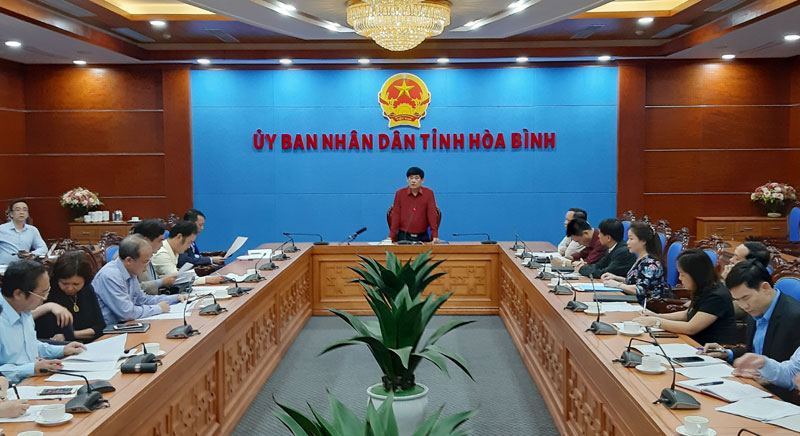
(HBO) – Vice Chairman of the provincial People’s Committee Nguyen Van Dung chaired a recent conference to evaluate an investment project on assisting 36 poorest villages in the province.
Photo:
Vice Chairman of the provincial People’s Committee Nguyen Van Dung concludes
the conference
In 2013, the
province ranked 36 villages as the poorest with high rate of poverty, poor infrastructure,
and low income of local residents. On January 20, 2014, the provincial People’s
Committee issued Decision No.73/QD-UBND, approving a project on supporting
those localities with total investment of 133.9 billion VND. The project is
designed to improve local infrastructure, develop production to raise locals’
income, and preserve traditional cultural values.
After five years implementing the projects, the rate of poor and
near-poor households in those villages fell by an average 5 percent per year,
from 41 percent in 2014 to 31 percent in 2018. Roads and electricity facilities
have been built in most of the villages.
All capital allocated to production development has been disbursed.
Thanks to the project, Mai Hoang Son village in Mai Chau
district’s Mai Hich commune, and Dau Khu village in Hoa Binh city’s Thong Nhat
commune have escaped from poverty and been excluded from the list of poorest
villages in the province.
However, due to capital shortage, several targets of the project have not been
realised, with more than 60 percent of planned infrastructure items not
receiving investment yet. Some villages have not received investment for
building automobile-accessible roads and clean water facilities. There is a
lack of standard schools, cultural houses and irrigational systems, while the existing
facilities are degrading. In addition, although many production models have
shown efficiency, they have failed to produce pervasive effects. Particularly,
many villages have been hard hit by landslide and flooding in the past two
years, including So hamlet in Trung Thanh commune and Nhap village in Da Bac
district’s Dong Ruong commune, with most essential infrastructure and
production models destroyed./.
Mai Chau district has firmly established itself as a standout destination on Vietnam’s tourism map, attracting both domestic and international visitors with its breathtaking landscapes, rich ethnic culture, and warm hospitality. However, beyond its natural and cultural charm, a secure and well-managed tourism environment has added to Mai Chau’s appeal.
As Vietnam enters a new phase of economic and administrative reform in 2025, Hoa Binh province is stepping up its efforts to streamline governance, boost economic growth, and attract investment.
The Hoa Binh provincial People's Committee held its monthly meeting on March 26 to review the progress of key projects, assess budget revenue and public investment disbursement, provide feedback on draft documents for submission to the provincial Party Committee's Standing Board, and discuss other important matters related to the committee's governance activities.
Playing a key role in Hoa Binh province’s economic development, Luong Son district has been focusing on science and technology development, innovation, and digital transformation.
Identifying the application of online public services as a key step in administrative procedure reform and e-government building, Kim Boi district has proactively provided services and supported residents and businesses in accessing and utilising full-process online public services promptly and efficiently. The locality aims to lift the rate of end-to-end online public services to over 90%, with all officials and civil servants handling tasks in the digital environment.
Nguyen Anh Tuyet, hailing from a family steeped in the ancient art of herbal medicine, is transforming local medicinal herbs into high-value concentrated extracts, elevating their worth and healing potential.



